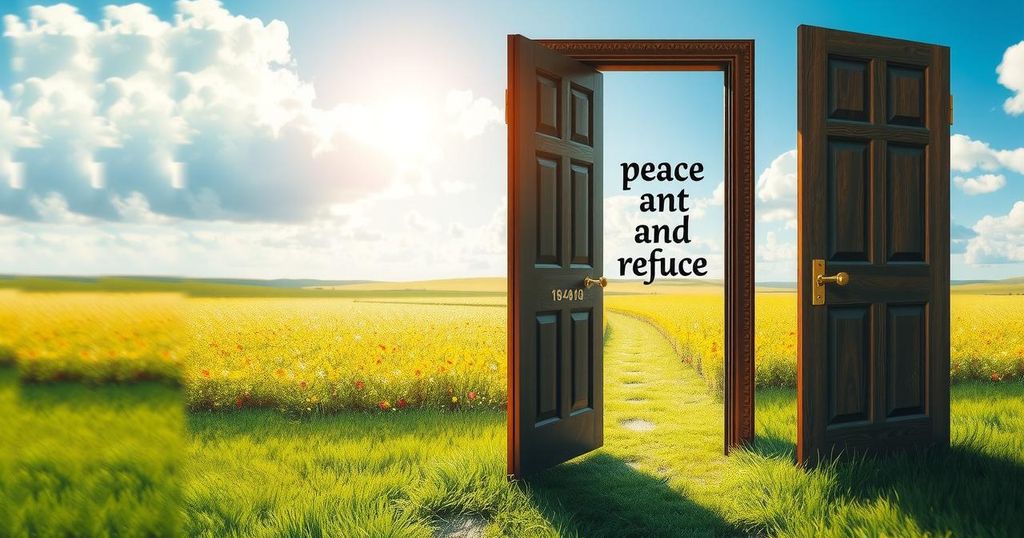Human rights groups are advocating for Ukraine to let captured North Korean soldiers seek refuge in South Korea to avoid severe punishment upon repatriation. This arises after Ukraine’s capture of two North Korean soldiers amid growing military cooperation between North Korea and Russia, which poses violations of international law and ethical concerns regarding the treatment of POWs.
Human rights organizations are appealing to Ukraine to permit North Korean prisoners of war (POWs) to seek asylum in South Korea instead of being repatriated to their homeland, where they risk severe punishment or execution. In an open letter addressed to Ukraine’s embassy in Seoul, the Transitional Justice Working Group, alongside eight additional groups, articulated their concerns regarding the potential fate of these individuals if sent back to North Korea.
This call for action comes in the wake of Ukraine’s capture of two North Korean soldiers in January 2024, located in Russia’s Kursk region. Ukrainian President Volodymyr Zelenskyy proposed the possibility of exchanging these soldiers for Ukrainian prisoners held by Russia, but activists counter that such an action would contravene Article 45 of the Geneva Convention, which prohibits forced repatriation of individuals at risk of persecution.
Reports indicate that North Korea has sent between 10,000 to 12,000 troops to support Russian forces, signaling a high level of military involvement since the Korean War. This heightened military collaboration stems from the growing relationship between North Korean leader Kim Jong Un and Russian President Vladimir Putin, as formalized in a mutual assistance agreement signed during their summit in June 2024.
These North Korean troops, primarily functioning as light infantry, are integrated within Russian military units under false identities. They are tasked with holding defensive positions and supporting trench warfare, with senior North Korean officers coordinating operations from secure locations. Ukrainian intelligence has highlighted the presence of three North Korean generals involved in this military endeavor, including Colonel General Kim Yong Bok, commander of special forces.
Ukrainian intelligence reports that approximately 3,000 of these soldiers, which constitutes about 40% of their original deployment, have been killed or injured as of January 2025. Following a brief hiatus of three weeks from the battlefield, North Korea purportedly dispatched an additional 3,500 soldiers to undergo training in Russia’s Far East.
In exchange for its military support, North Korea receives substantial remuneration from Russia, particularly in the form of increased oil exports and other critical resources. A South Korean intelligence-affiliated institution estimated that North Korea profited approximately $540 million from arms sales in 2023, mostly directed towards Russia.
Moreover, the Institute for the Study of War posits that North Korea perceives the conflict in Ukraine as an essential learning opportunity to evaluate its military capabilities against Western technological assets and acquire firsthand combat experience. This strategic alliance serves to bolster North Korea’s anti-Western rhetoric while possibly altering the military landscape of the Korean Peninsula.
Such actions are in direct violation of U.N. Security Council Resolution 1874, which forbids North Korea from exporting military assets. The current situation has invoked international disapproval, resulting in renewed sanctions imposed by both the United States and South Korea.
Human rights advocates contend that permitting North Korean POWs to defect might inspire additional soldiers to surrender, which could diminish Pyongyang’s military support for Russia. South Korean lawmaker Yu Yong-weon, who recently visited Ukraine, noted that one of the captured soldiers expressed a clear desire to defect, while the other remained ambivalent.
In summary, human rights organizations are urging Ukraine to allow North Korean POWs to seek refuge in South Korea to prevent their likely persecution upon repatriation. The increasing military collaboration between North Korea and Russia, along with the significant casualties among North Korean soldiers, highlights the complexities of international relations in this context. Moreover, International law considerations underscore the importance of protecting human rights amid ongoing conflicts.
Original Source: www.dailynk.com




